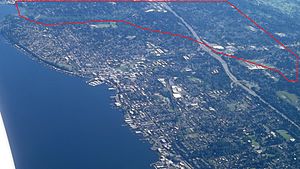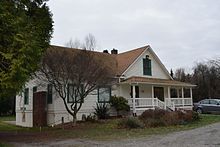| Forbes Creek | |
|---|---|
 Aerial view of Kirkland with Forbes Creek watershed highlighted. North is up. Downtown Kirkland on Moss Bay is slightly left of center, Juanita Bay is at upper left. Forbes Lake is northeast of the I-405 cloverleaf. Aerial view of Kirkland with Forbes Creek watershed highlighted. North is up. Downtown Kirkland on Moss Bay is slightly left of center, Juanita Bay is at upper left. Forbes Lake is northeast of the I-405 cloverleaf. | |
 Map showing the course of Forbes Creek, wetlands, and the approximate extent of its drainage area Map showing the course of Forbes Creek, wetlands, and the approximate extent of its drainage area | |
  | |
| Location | |
| Country | United States |
| State | Washington |
| Region | King County |
| City | Kirkland, Washington |
| Physical characteristics | |
| Source | |
| • coordinates | 47°40′48.5″N 122°10′4″W / 47.680139°N 122.16778°W / 47.680139; -122.16778 |
| • elevation | 360 ft (110 m) |
| Mouth | Juanita Bay Park |
| • location | Lake Washington |
| • coordinates | 47°41′56″N 122°12′39″W / 47.69889°N 122.21083°W / 47.69889; -122.21083 |
| • elevation | 16 ft (4.9 m) |
| Length | 2.5 mi (4.0 km) |
| Basin size | 6.6 sq mi (17 km) |
Forbes Creek is a small, moderately sloping creek wholly within the city of Kirkland, Washington. From its headwaters on the Rose Hill moraine to its outlet at Juanita Bay is c. 2 miles (3.2 km) as the crow flies. The northern extent of its basin is a nearly east–west line at NE 116th Street; the eastern boundary is at the Rose Hill ridgeline, roughly north–south at 132nd Avenue NE. The southern extent is irregular trending roughly from Kirkland's high point at the northeast corner of Bridle Trails State Park (535 ft (163 m), 47°39′26″N 122°10′21″W / 47.65722°N 122.17250°W / 47.65722; -122.17250) through South Rose Hill Park, to Lake Washington at 16 feet (4.9 m) above sea level.
Two major branches of the creek rise on Rose Hill between NE 70th Street and NE 85th Street and then run south to north on Rose Hill. One rises in the vicinity of Lake Washington High School and runs north past Costco #008 to Forbes Lake. The other rises slightly to the east in the vicinity of Rose Hill Elementary School then through North Rose Hill Woodlands Park. The two join north of the lake then run west through a two-meter culvert under Interstate 405 near NE 100th Street, under the Cross Kirkland Corridor, into the Forbes Creek Valley and Juanita Bay Wetlands Park. The creek finally empties into Lake Washington at Juanita Bay, less than a kilometer from the mouth of Juanita Creek which empties into the same bay.
Watershed and wetlands
The Forbes Creek watershed is a 1,837-acre (743 ha) drainage basin covering a quarter of Kirkland's total land area. Forbes Creek empties into Lake Washington in the neighborhood of Juanita. Twenty two wetlands exist in the basin, comprising the greatest number and area of wetlands of any creek in Kirkland (there are no rivers).
Plant species
Invasive plant species including Himalayan blackberry are present in Kirkland's watersheds. Introduced (possibly cultivated) European cranberry grows around Forbes Lake.
-
 Invasive Himalayan blackberry and holly in the creekbed mixed with native salal and sword fern undergrowth beneath alder and cedar trees
Invasive Himalayan blackberry and holly in the creekbed mixed with native salal and sword fern undergrowth beneath alder and cedar trees
-
 European cranberry on lake shore
European cranberry on lake shore
-
 Tree in Forbes Lake Park chewed by beavers
Tree in Forbes Lake Park chewed by beavers
-
 Beaver in the bay's lily pads
Beaver in the bay's lily pads
-
 Birdwatchers on Juanita Bay Park's Lake Washington shoreline
Birdwatchers on Juanita Bay Park's Lake Washington shoreline
Ice age creation
The landforms and hydrology of the Eastside, including Forbes Creek, are due to the ice age glaciation. Forbes Creek watershed displays every aspect of typical Eastside moraines described by Harvey Manning and Ira Spring, as an "'unorganized' geography on glacial moraine with bogs and creeks reaching lake level".
Forbes Lake
Forbes Lake (47°41′09″N 122°10′47″W / 47.68583°N 122.17972°W / 47.68583; -122.17972) is a 7-acre (2.8 ha), 30-foot (9.1 m) deep kettle lake at elevation 246 feet (75 m) above sea level. The city is developing areas around the lake under a Forbes Lake Trail and Park Improvements Project of 16 acres (6.5 ha). Wildlife in the area includes frogs and turtles in the lake; raptor bird species including hawks and bald eagles which use the tall trees around the lake; aquatic birds using the lake and surrounding wetlands include ducks and great blue herons; and mammals such as beaver, deer, and coyotes.
 Forbes Lake in the winter
Forbes Lake in the winter
Naming

Forbes Lake is named for the Forbes family of settlers. Dorr Forbes, a Civil War veteran with 33rd Illinois Volunteer Infantry Regiment, from La Moille, Illinois, and his wife Eliza established a farm on the lake in 1882, growing cranberries. The farming was ruined by beavers and the family sold the land which later became the steel mill site (see below). The family also had a shingle mill on Juanita Creek, and a home on Juanita Bay, built in the 1870s in Madison Park, Seattle and moved across the lake by barge or boat to what is now Juanita Beach Park. It was rebuilt in 1905.
Steel mill
Forbes Lake was the site of the Kirkland Steel Mill, built by the city's founder Peter Kirk, but it never produced any steel. The enterprise folded in the Panic of 1893.
Juanita Bay Park

The wetlands where Forbes Creek enters Lake Washington are Juanita Bay Park, Kirkland's largest city park at 110 acres (45 ha). A Duwamish village was located there prior to 1830, and wapato tubers harvested in the wetlands. Inhabitants include large numbers of year-round and overwintering birds, including osprey, owls, bald eagles, herons and woodpeckers. As many as 1,600 birds have been counted at once in the park. The park also is home to many mammal species including beaver, muskrat, nutria, raccoon, river otter, weasel, and coyote.
The Forbes Creek wetlands are noted as prime urban birdwatching areas by The National Geographic Society, Reader's Digest, and many Pacific Northwest guidebooks.
The Juanita Bridge, built in 1891 and rebuilt in 1932, carried Market Street wagon traffic, later automobile traffic, across the wetland. It was converted to pedestrian-only use in 1974 when a new bridge was built slightly to the east.
References
- Parametrix 2005, p. 19.
- "Kirkland high point". Peakbagger.com. Retrieved December 15, 2016.
- The Watershed Company 1998.
- I-405 Kirkland Nickel Project – Stage 1 Construction Environmental Improvements (Forbes Creek) (PDF), Washington State Department of Transportation, March 2006
- Parametrix 2005, p. 20.
- The Watershed Company 1998, p. 51.
- The Watershed Company 1998, pp. 11, 21, 41, etc..
- Manning, Manning & Spring 2002.
- "Forbes Lake vital statistics", Water and land services small lakes database, King County, Washington, retrieved December 15, 2016
- "A Gift from the Ice Age" interpretive sign, City of Kirkland, 120th Avenue public access on southwest corner of lake.
- U.S. Geological Survey Geographic Names Information System: Forbes Lake
- Worthy and Associates 2009, p. 4.
- "Detail Report: Forbes, Dorr PVT, 33 IL US INF Company E", Illinois Civil War database, Illinois Secretary of State, record 84767, retrieved December 24, 2016
- https://www.kirklandwa.gov/files/sharedassets/public/parks-amp-comm-services/online-parks-guide/pdfs/juanitabeachpark_history.pdf
- Juanita "remember when" map 1900-1918, derived from records and oral history, at Kirkland branch map file, King County Library System
- ^ King County Historic Preservation 2002.
- Matthew McCauley, Juanita's First Family, Kirkland Heritage Society
- Ely 1975.
- Manning 1995, p. 61.
- Park guide, City of Kirkland
- Cathy McDonald (January 19, 2011), "Juanita Bay Park is a popular winter walk, well-interpreted", The Seattle Times
- Manning, Manning & Spring 2002, p. 76.
- City of Kirkland 2011.
- Alderfer 2006, p. 12.
- Dolezal 2007, p. 44.
- Stevens & Weber 2016, p. 73.
- Kirkland Historical Tour, Eastside Heritage Center, 2006
- Juanita Bridge, Lake Washington, Museum of History and Industry, image 1998.10.39 – via University of Washington digital collections
Bibliography
- Alderfer, Jonathan (2006), National Geographic Field Guide to Birds: Washington & Oregon, National Geographic Books, ISBN 9780792253136
- Dolezal, Robert J. (2007), Where the Birds Are: A Travel Guide to Over 1,000 Parks, Preserves, and Sanctuaries, Reader's Digest Association, ISBN 9780762108602
- Ely, Arline (1975), Our Foundering Fathers (PDF), Kirkland Public Library
- Juanita Bay Park: An Urban Wildlife Habitat (PDF), City of Kirkland, February 1, 2011
- King County Historic Preservation Program (c. 2002), Juanita Beach Park History (PDF) – via City of Kirkland
- Manning, Harvey; Manning, Penny; Spring, Ira (2002), "The Eastern Moraines: Overlake", Best Winter Walks and Hikes: Puget Sound, The Mountaineers Books, pp. 59–60, ISBN 9780898868227
- Manning, Harvey (1995), Walks and Hikes in the Foothills and Lowlands Around Puget Sound, Mountaineers Books, ISBN 9780898864311
- Parametrix (2005), "Existing Conditions and Problems in Kirkland's Watersheds", Surface Water Master Plan, City of Kirkland, archived from the original on March 7, 2015 (Chapter 3 Archived 2017-02-11 at the Wayback Machine)
- Stevens, Bryce; Weber, Andrew (2016), 60 Hikes Within 60 Miles: Seattle: Including Bellevue, Everett, and Tacoma, Menasha Ridge Press, ISBN 9781634040181
- The Watershed Company (July 1998), "Forbes Creek Basin", Kirkland's Streams, Wetlands and Wildlife Study, pp. 48–58, archived from the original on March 28, 2015 – via City of Kirkland
- Worthy and Associates (March 2009), Forbes Lake Trail and Park Improvements Plan (PDF) – via City of Kirkland
External links
- Forbes Lake Trail and Park Improvements Project Archived 2017-01-18 at the Wayback Machine at Kirkland Parks
- Stream report at King County Department of Natural Resources